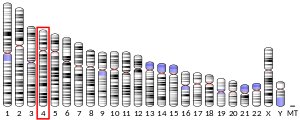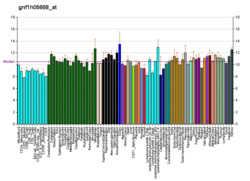SH3RF1
Putative E3 ubiquitin-protein ligase SH3RF1 is an enzyme that in humans is encoded by the SH3RF1 gene.[5][6]
Function
This gene encodes a protein containing an N-terminus RING-finger, four SH3 domains, and a region implicated in binding of the Rho GTPase Rac. Via the RING-finger, the encoded protein has been shown to function as a ubiquitin-protein ligase involved in protein sorting at the trans-Golgi network. The encoded protein may also act as a scaffold for the c-Jun N-terminal kinase signaling pathway, facilitating the formation of a functional signaling module.[6]
Interactions
SH3RF1 has been shown to interact with AKT2[7] and MAP3K11.[7]
gollark: The angle at the top of the small (W_y/W/W_x) triangle is also 30 degrees, probably.
gollark: It's an irrelevant semantic issue.
gollark: It doesn't really matter.
gollark: Oh, neat.
gollark: Some proportion of naturally occurring water has deuterium in it, and they presumably separated it out somehow.
References
- GRCh38: Ensembl release 89: ENSG00000154447 - Ensembl, May 2017
- GRCm38: Ensembl release 89: ENSMUSG00000031642 - Ensembl, May 2017
- "Human PubMed Reference:". National Center for Biotechnology Information, U.S. National Library of Medicine.
- "Mouse PubMed Reference:". National Center for Biotechnology Information, U.S. National Library of Medicine.
- Tapon N, Nagata K, Lamarche N, Hall A (Apr 1998). "A new rac target POSH is an SH3-containing scaffold protein involved in the JNK and NF-kappaB signalling pathways". EMBO J. 17 (5): 1395–404. doi:10.1093/emboj/17.5.1395. PMC 1170487. PMID 9482736.
- "Entrez Gene: SH3RF1 SH3 domain containing ring finger 1".
- Figueroa C, Tarras S, Taylor J, Vojtek AB (Nov 2003). "Akt2 negatively regulates assembly of the POSH-MLK-JNK signaling complex". J. Biol. Chem. 278 (48): 47922–7. doi:10.1074/jbc.M307357200. PMID 14504284.
Further reading
- Lyons TR, Thorburn J, Ryan PW, Thorburn A, Anderson SM, Kassenbrock CK (2007). "Regulation of the Pro-apoptotic scaffolding protein POSH by Akt". J. Biol. Chem. 282 (30): 21987–97. doi:10.1074/jbc.M704321200. PMID 17535800.
- Kimura K, Wakamatsu A, Suzuki Y, Ota T, Nishikawa T, Yamashita R, Yamamoto J, Sekine M, Tsuritani K, Wakaguri H, Ishii S, Sugiyama T, Saito K, Isono Y, Irie R, Kushida N, Yoneyama T, Otsuka R, Kanda K, Yokoi T, Kondo H, Wagatsuma M, Murakawa K, Ishida S, Ishibashi T, Takahashi-Fujii A, Tanase T, Nagai K, Kikuchi H, Nakai K, Isogai T, Sugano S (2006). "Diversification of transcriptional modulation: large-scale identification and characterization of putative alternative promoters of human genes". Genome Res. 16 (1): 55–65. doi:10.1101/gr.4039406. PMC 1356129. PMID 16344560.
- Alroy I, Tuvia S, Greener T, Gordon D, Barr HM, Taglicht D, Mandil-Levin R, Ben-Avraham D, Konforty D, Nir A, Levius O, Bicoviski V, Dori M, Cohen S, Yaar L, Erez O, Propheta-Meiran O, Koskas M, Caspi-Bachar E, Alchanati I, Sela-Brown A, Moskowitz H, Tessmer U, Schubert U, Reiss Y (2005). "The trans-Golgi network-associated human ubiquitin-protein ligase POSH is essential for HIV type 1 production". Proc. Natl. Acad. Sci. U.S.A. 102 (5): 1478–83. doi:10.1073/pnas.0408717102. PMC 545085. PMID 15659549.
- Figueroa C, Tarras S, Taylor J, Vojtek AB (2003). "Akt2 negatively regulates assembly of the POSH-MLK-JNK signaling complex". J. Biol. Chem. 278 (48): 47922–7. doi:10.1074/jbc.M307357200. PMID 14504284.
- Nakayama M, Kikuno R, Ohara O (2002). "Protein-protein interactions between large proteins: two-hybrid screening using a functionally classified library composed of long cDNAs". Genome Res. 12 (11): 1773–84. doi:10.1101/gr.406902. PMC 187542. PMID 12421765.
- Nagase T, Kikuno R, Ishikawa K, Hirosawa M, Ohara O (2000). "Prediction of the coding sequences of unidentified human genes. XVII. The complete sequences of 100 new cDNA clones from brain which code for large proteins in vitro". DNA Res. 7 (2): 143–50. doi:10.1093/dnares/7.2.143. PMID 10819331.
This article is issued from Wikipedia. The text is licensed under Creative Commons - Attribution - Sharealike. Additional terms may apply for the media files.




